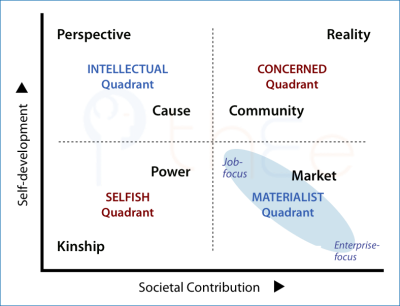Mind-sets in Policy Inquiries
Interacting-for-Benefit
Interaction between the government and the policy source is crucial to proposals. Policy generation is also influenced by how the players imagine that government will deliver benefits for the public.
TOP contains a framework that helps us understand what is going on when people interact for gain (e.g. as you are doing now in visiting this website).
 The Prosperity Framework
The Prosperity Framework
As well as helping you become aware of how you interact with others (and how others seek to interact with you), this framework also provides insights in regard to:
«Interacting for Benefit» was the first major THEE framework developed as part of TOP and is not published or available in conventional print form.
THEE identifies distinctive approaches (or mindsets) when interacting for benefit. Each has sharply differing assumptions about what to think, aim for and do. Compare the 7 mentalities/approaches here.
Application to Policy Inquiries
Public inquiries…
…are based on community-centred + reality-centred assumptions.

 More…
More…
These approaches constitute the CONCERNED quadrant in the TET diagram. Often those in charge are expected to reach the truth and are given many essential powers, including to compel attendance and to release official documents. Royal Commissions are an example.
It seems that public inquiries could be more used to develop future policy, given their focus on community needs and aspirations, and their ability to penetrate hidden motives and determine what the real situation actually is.
Politicians currently fear such powers, so it requires something going wrong in a big way to build sufficient pressure to get them to agree to a public inquiry. Refusal tends to be on the basis of cost or overkill.
Think-tank Reports…
…are based on cause-centred + perspective-centred assumptions.
 More…
More…
These approaches sit in the INTELLECTUAL quadrant where there is a focus on productivity and a commitment to ideas. These ideas are never universally shared in society.
Ideology-based institutes and academic disciplines both support causes to which investigators commit themselves and their working life.
The use of multi-disciplinary teams for theme-based and system-oriented inquiry is a response to an awareness that many perspectives ( i.e. each of which is often a cause) are perfectly valid.
Departmental Papers…
…are produced within a power-centred setting. All officials become socialized in handling power. However, all approaches (except kinship-centred probably) are needed for high quality papers.
 More…
More…
Government bureaucracies are complex beasts. As well as the SELFISH quadrant, they cannot do without MATERIALIST and INTELLECTUAL approaches.
Some departments will contain people who are market-centred who have been recruited from business for this specific reason. Some people in specialist departments will likely be cause-centred experts. In the higher reaches of some departments there is certainly a need for staff who are perspective-centred.
Approaches from the CONCERNED quadrant may be less in evidence, or more problematic if present.
Vested Interest Proposals…
…are produced from a power-centred viewpoint which is combined in industry with a market-centred approach; and by advocacy groups with a cause-centred approach.
 More…
More…
Industry, being in the MATERIALIST quadrant, makes a significant societal contribution (note X-axis); possibly more so than advocacy groups with a place in the INTELLECTUAL quadrant. However, in both cases, the power aspect in the SELFISH quadrant provides a warning.
The shared preoccupation with wealth and power by industry and government leads to a degree of commonality. The conventions and habits of doing deals, mutual favours, seeking control, kickbacks and so on are well understood on both sides.
By blurring boundaries e.g. co-opting industry staff into government departments or rotating people between internal and external postings, a government department can be taken over by the industry it should be regulating.
Advocacy groups impact on government through effects on voters. So politicians keep a careful eye on which groups are genuinely popular and supported (regardless of what is being advocated).
Anon has this to say… “An honest politician is one who, when he is bought, stays bought”.
“An honest politician is one who, when he is bought, stays bought”.
and this…  “If you can’t drink a lobbyist’s whiskey, take his money, sleep with his women and still vote against him in the morning, you don’t belong in politics.”
“If you can’t drink a lobbyist’s whiskey, take his money, sleep with his women and still vote against him in the morning, you don’t belong in politics.”
Originally posted: August-2009; Last updated: 15-Nov-2011
